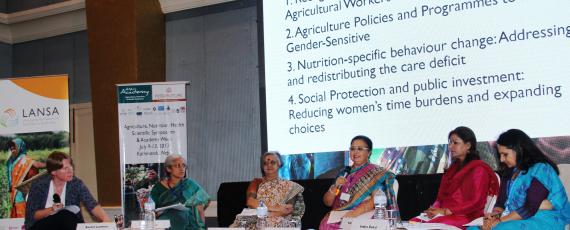Bringing the spotlight on women agriculture workers and their nutrition condition

LANSA successfully hosts South Asia policy dialogue at ANH Symposium in Kathmandu, Nepal
On July 12, the plenary session hosted by LANSA at the 2nd Agriculture, Nutrition, Health (ANH) Academy Week and Feed the Future Nutrition Innovation Lab Scientific Symposium in Kathmandu, Nepal, brought together researchers, policymakers and policy influencers to discuss ‘Improving Nutrition Through Recognising, Protecting and Promoting the Rights and Wellbeing of Women Agricultural Workers in South Asian countries’.
This regional stakeholder engagement event provided a unique platform to dialogue with key persons from Bangladesh, India, Nepal and Pakistan in order to recognise women agricultural workers and lay emphasis on the negative impact their work has on the woman’s own nutrition as well as the wellbeing of her family.
Gender is a cross-cutting issue in the context of agriculture
Women are key actors within the food system, but are chronically disempowered in some parts of the South Asia region. Women’s lack of power in LANSA focus countries weakens the links between agriculture and nutrition. Gender is a cross-cutting issue in the context of agriculture, thus LANSA has addressed it explicitly in several studies, and across all our main research themes. For LANSA to make agriculture and nutrition work, Gender must be at the very core.
Policies and laws for the rights and wellbeing of women agricultural workers in South Asia is an effective way of improving the woman’s nutrition and her family’s wellbeing. The Regional Dialogue hosted by LANSA thus aimed at creating demand for research evidence that highlights the critical role of women in South Asian agriculture in improving nutrition and to help foster a region‐wide debate on ways in which this evidence might influence laws, policies, programmes and initiatives.
Sharing findings from LANSA research for panel opinion
Representatives of LANSA focus countries and from the host country- Nepal, were asked to respond to the findings and share their experiences and lessons from addressing the rights and wellbeing of women agricultural workers through policies, programmes, initiatives and laws. They eminent members included Nafisa Shah - Member, National Assembly of Pakistan; Khushi Kabir - Coordinator, Nijera Kori, Bangladesh; Jatinder Kishtwaria - Director, ICAR-Central Institute for Women in Agriculture, Govt of India; and Indira Dahal - Joint Secretary of Nepal Law Commission.
The session was moderated by Rachel Lambert - Senior Livelihoods Adviser, Agriculture Research, Department for International Development (DFID), UK government. Nitya Rao, LANSA’s Gender Crosscut Lead presented a synthesis of LANSA findings and spoke on the linkages between women’s agricultural work and nutrition.
Four key areas for policy attention were raised for discussion:
1. Recognition of women as farmers and agricultural workers – we are still far in South Asia. The need to provide equal entitlement to agricultural services, input credit, land, etc., for women farmers and recognize women as agricultural workers.
2. At agricultural policy level - for better gender sensitive polices.
3. Nutrition-sensitive behaviour change to address the issue care deficit, time deficit for care, rather than just social norms.
4. Social protection and public investments - take account of women’s time, work burden, and expanding choices.
The panel highlighted several messages ranging from overall gender sensitisation in the patriarchal South Asia society, to empowerment and rights of women workers, entitlements that effect her health, nutrition, and wellbeing, to the need for women representations at different governance level, adding the importance of getting grassroots voice heard by policy decision-makers.
The session thus raised the profile of a crucial yet neglected issue in South Asia - women’s work in agriculture and its implications for nutrition, and provided opportunity for potential ‘champions’ who would echo key evidence-based messages to policy authorities.
The LANSA Film: Women in agriculture in South Asia: the nutrition connection was broadcast for the audience. Event concept note is here.








Add new comment